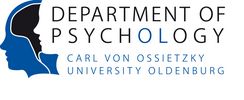Contact
OSIG Task Force
OSIG
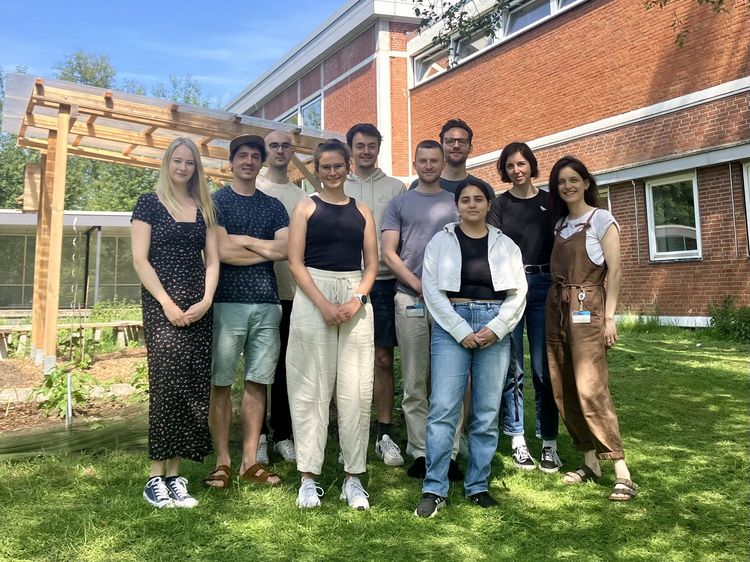
Mission Statement
The Open Science Interest Group (OSIG) of the Psychology Department identifies as a learning community and grass-roots movement initiated by scientific staff and students. It is open to anyone interested in improving their skills in making science transparent and reproducible. The OSIG aims at facilitating the discourse about OS practices in the department. Since following these principles can be demanding, time costly, and complicated at first, the OSIG was also established to bundle experience and knowledge and create a space in which researchers can support and strive towards more transparent research.
In addition to providing a platform for exchange, the interest group actively develops ideas concerning the integration of open science techniques in the department. Small groups of interested members are then formed to implement these ideas. Inclusivity is very important to us, hence there are no prerequisites for active involvement. Our principle is that everyone can join and contribute as much as they like and is feasible for them. The OSIG is represented by its task force including members of all labs.
The goals of the OSIG, therefore, include:
- Supporting each other and encouraging the use of OS principles in our own research.
- Providing a platform to work on OS related tasks that are important to the involved members. The study group can, for instance, be utilised to identify collaborators and document efforts.
- Collecting, exchanging, and discussing OS related information. Results should be made accessible for interested researchers in the department by sharing documents and organizing information events.
- Spreading information, e.g., about upcoming webinars/talks.
How to get involved
Would you like to get involved? Resources and projects are coordinated via a Stud.IP study group. Important information and announcements are also sent around to all members of this group. If you are associated with the University of Oldenburg (student or staff) you can send a membership request here and we will approve you as soon as possible.
We have biweekly meetings (Tuesdays 11-12 a.m. on uneven calendar weeks) that are open to everyone interested. You can join via the study group.
If you have further questions, please do not hesitate to contact our members via the study group or the mailing list or add your name to Openscience-Psychology mailing list to stay up to date with OS-related news and events.
Achievements
Some of the goals that were already achieved include
- The OSIG won the first UGO-Open-Science-Award (2023)! We are still over the moon and thank the Universitätsgesellschaft Oldenburg for this great award.
- Initiation of biweekly meetings of the interest group that can be attended by everyone to discuss current projects.
- Organisation of open science colloquium talks concerning, e.g., registered reports, data sharing, code sharing, power calculations. The series of talks is ongoing, so stay tuned for upcoming events.
- Application for a grant to finance the implementation of a preregistration tool for master theses
- Initiation of the OSIG Commitment to Research Transparency
Newsletters
1st issue: 04/22
Moin dear Open Science friends of Oldenburg (and beyond),
We are happy to announce that we are starting a newsletter. From now on every two months you will be updated about what has been going on in the OSIG, upcoming events, general open science news and more. In this first issue we will include a small general recap on what the OSIG has worked on so far.
Please feel free to share this newsletter and, as always, you’re welcome to join our online biweekly meetings (Tuesdays 11-12 a.m. on uneven calendar weeks: Next meeting on 26th of April) that are open to everyone.
Recap of OSIG
- In the Open Science Series of the Psychological colloquium, you can attend open science related talks three times a semester. So far, we organized the following talks:
- Open Science: What have we achieved, where do we go? (Prof. Dr. Felix Schönbrodt, LMU)
- Open Access publishing and funding possibilities at the University of Oldenburg (Kim Braun, BIS UOL)
- Experiences with Registered Reports: An Update (Jill von Conta, UOL)
- Open Code (Sarah Blum and Arnd Meiser, UOL)
- Pre-registration & Data Sharing (Dr. Stephanie Rosemann, Georgetown U)
- Introduction of the DFG Core Facility Grant (Dr. Tina Schmitt, UOL)
- Introducing the OSIG (Nadine Jacobsen, UOL)
- Registered reports (Jill von Conta, UOL)
- The Department of Psychology now has an open science website, introducing the OSIG, TORS, and also showcasing our publications following open science principles (yes, open access is enough!). For your research to be listed please send the reference to merle.marek@uol.de
- Together with TORS we joined the Network of Open Science Initiatives, which is the central platform for the Network of (German-speaking) Open Science Initiatives
- We initiated the creation of a department twitter account @psychOLogyOL. Mareike Daeglau (re-)tweets interesting articles and news concerning our department. For your research to be featured please send her your tweet (or a draft of a possible tweet if you do not have an account yourself).
- Via our mailing list openscience-psychology@listserv.uni-oldenburg.de you can send and receive information about upcoming events. If you are receiving this mail you already signed up :)
- With the newsletter you are reading right know, you can stay up-to-date with the recent work of the OSIG
- Use this overview of expertise within our department (study group access required) to check who has experience with certain methods or topics and would be willing to help you. If you are willing to help others, please extend the list.
We were also involved in some projects that so far were not successful yet and are ongoing. For instance, we were involved in applying for funds to enable students to internally preregister their master’s theses or to get a student assistant to evaluate if and how open science knowledge could be further integrated into the Neurocognitive Psychology study program. We will keep you updated on the progress.
Upcoming events
- Open Science Series summer term 2022, Psychological Colloquium, Thursdays 16:15-17:45
- June 09: Dr. Tina Lonsdorf, UKE Hamburg. Details TBA
- Other dates TBA
- 02.05.22, 10:15-11:45, online: introductory git workshop by Paul Maanen (PhD student Neuropsychology Lab) for department members here. Please let us know here if you plan to join.
- 23.09.22: one-day workshop on Bayesian Statistics by Prof. Dr. Daniel Schad. Workshop is primarily directed at interested master's students, but spots can also be filled by scientific staff. Details TBA
External events:
- 01.09.22: One-day Netherlands National Open Science Festival Vrije Universiteit, Amsterdam, registration free of charge (https://opensciencefestival.nl/)
- 27.10.22: OS NovaTalk; Prof. Dr. F. Miedema, University of Utrecht: The Transition to Open Science, why and how
For updates on events please refer to the Open Science website of our department.
Open Science News
- 17.03.22: DFG signed action plan for supporting infrastructure of diamond open access publication (https://www.dfg.de/foerderung/info_wissenschaft/2022/info_wissenschaft_22_26/index.html)
This newsletter is sent to you by the Open Science interest group of the Psychology Department of Oldenburg (https://uol.de/psychologie/open-science/osig). Would you like to get involved? Resources and projects are coordinated via a Stud.IP study group. Important information and announcements are also sent around to all members of this group. If you are associated with the University of Oldenburg (student or staff) you can send a membership request here and we will approve you as soon as possible.
If you have further questions, please do not hesitate to contact our members via the study group or the mailing list osi_psychology_task-force@lists.uni-oldenburg.de or add your name to Openscience-Psychology mailing list (https://mailman.uni-oldenburg.de/mailman/listinfo/openscience-psychology).
2nd issue: 06/22
Moin dear Open Science friends of Oldenburg (and beyond),
welcome to the second issue of our newsletter. In this issue we will include a small recap on the last two months. The main focus of our work was on data sharing and protection issues in the community and our department.
Please feel free to share this newsletter and, as always, you’re welcome to join our online biweekly meetings (Tuesdays 11-12 a.m. on uneven calendar weeks: Next meeting tomorrow, 21st of June) that are open to everyone. Previous newsletter issues can be retrieved from the OSIG website.
Recap of the last two months
- We continued the Open Science Series of the Psychological colloquium with the following talks::
- May 2: Multiverse analyzes in cognitive neuroscience – The METEOR project (Prof. Dr. Andrea Hildebrandt, UOL)
- June 9: Opening pandora's box: Practices, Problems, Prospects and Perspectives of data sharing in Psychology (Dr. Tina Lonsdorf, UKE Hamburg)
- Tina was so kind to share her slides and you can find a short summary of the post-talk discussion here.
- We approached the data protection officer of our university (Lars Galow) with a catalog of questions regarding data protection issues in data sharing. If you are part of our study group, you can find his answers here. In summary, he provided us with the following information:
- Data protection regulations do not apply to anonymized data (behavioral data without identifiers are anonymized, for brain data that’s not clear yet). Therefore, anonymized data can theoretically be shared without the participant’s explicit consent (However, from an ethical point of view it is highly recommended to ask for the participant’s consent!)
- To foster the use of version control of code, we organized an introductory git workshop by Paul Maanen (PhD student Neuropsychology Lab) for department members on May 2. Please find the material here.
- Together with Prof. Andrea Hildebrand and Dr. Kerstin Bleichner we applied for funds at “Innovation Plus” to enable students to internally preregister their master’s theses. Unfortunately, this application was not successful but we will re-apply for the next financing round (2023/24).
Even though we learned a lot about data sharing in our field, we are not yet satisfied: We are currently looking more closely into available code sharing guidelines. Also, we are working on an extensive mindmap that integrates the information about ethical and legal aspects of data sharing in our field. We will keep you updated on the progress.
We would like to express our most heartfelt gratitude to all the speakers and experts who shared their knowledge with us!
Upcoming events
- Open Science Series summer term 2022, Psychological Colloquium, Thursdays 16:15-17:45
- July 21: TBA
External events:
- 01.09.22: One-day Netherlands National Open Science Festival Vrije Universiteit, Amsterdam, registration free of charge (opensciencefestival.nl)
- 27.10.22: OS NovaTalk; Prof. Dr. F. Miedema, University of Utrecht: The Transition to Open Science, why and how
For updates on events please refer to the Open Science website of our department.
Open Science News
- OpenPlato, a free e-learning platform that bundles quality-assured learning resources concerning the topic of open science was launched on June 1st! Find more details here.
This newsletter is sent to you by the Open Science interest group of the Psychology Department of Oldenburg (https://uol.de/psychologie/open-science/osig). Would you like to get involved? Resources and projects are coordinated via a Stud.IP study group. Important information and announcements are also sent around to all members of this group. If you are associated with the University of Oldenburg (student or staff) you can send a membership request here and we will approve you as soon as possible.
If you have further questions, please do not hesitate to contact our members via the study group or the mailing list osi_psychology_task-force@lists.uni-oldenburg.de or add your name to Openscience-Psychology mailing list (https://mailman.uni-oldenburg.de/mailman/listinfo/openscience-psychology).
3rd issue: 10/22
Moin dear Open Science friends of Oldenburg (and beyond),
we hope you enjoyed your semester break and want to warmly welcome everyone who joined the department since our last issue.
Please feel free to share this newsletter and, as always, you’re welcome to join our online biweekly meetings (Tuesdays 11-12 a.m. on uneven calendar weeks: Next meeting on 25th of October) that are open to everyone. Previous newsletter issues can be retrieved from the OSIG website.
Recap of the last months
- We continued the Open Science Series of the Psychological colloquium with the a video and discussion on a talk by Prof Simine Vazire (University of Melbourne, Australia) “Towards a More Self-Correcting Science”.
- The series will continue with internal talks in the next summer semester. If you cannot wait until then, please note that in the psychological colloquium on October, 27th at 6pm there will be a HWK Nova lecture on the topic of “Transition to Open Science, Why and How.” by Prof. Dr. Frank Miedema, Professor of immunology, University Medical Centre Utrecht, Utrecht University. You may join online here.
- Bayes workshop: In September, Prof Daniel Schad (HMU Potsdam) visited us in Oldenburg to give a talk on Bayesian statistics and workflows.
- For more information please have a look at his paper Toward a principled Bayesian workflow in cognitive science
- R scripts and data for the workshop can be retrieved here: https://osf.io/y354c/ and https://osf.io/b2vx9/
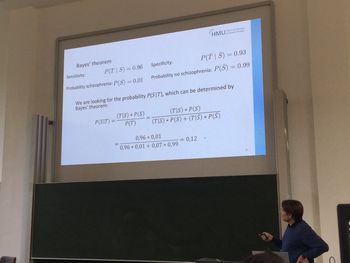
- In the last year we have worked on a way to give researchers in our department the chance to openly display their support of research transparency. We are proud (and a little relieved) to say that our Department's version of the commitment to research transparency is now online. Thanks again to everyone who participated in the process! If you want your name added to the list of signatories, please send a mail to merle.marek@uol.de.
- Please note that we adapted the original version of the statement, which means that our version does not come with a badge that you can put on your own website. If you have spare time and energy to make a badge that can be added to our statement, please feel invited to do so. If you want to additionally sign the original commitment (which includes the privilege to use the official badge) we encourage you to do so!
- If you are managing your own university website you can link the statement to your profile to create a better visibility of the OSIG Commitment and show that you are a signee, with the following steps :
- Stud.IP -> Profile -> Personal Details -> More Details
- Go to the box: “Research interest” and add: "Signee of the OSIG Commitment to research transparency"
- Highlight “OSIG Commitment to research transparency”
- Click on Link (or Ctrl+K)
- Paste in the URL Box: https://uol.de/psychologie/open-science/osig/osig-commitment-to-research-transparency
- Click "Accept"
- The information will be updated over night
- You can also add other things (e.g., CV, publications, etc) to your university web page
Action required!
- Since the practical project is coming up we want to take the opportunity to share a paper by Schönbrodt et al. (2022) to you concerning OS- based guidelines on what can be covered in a practical project. We hope you enjoy the read and maybe get inspired.
- In the upcoming months our department will welcome a lot of new students and PhDs. This might be a great time to consider signing up to our list of expertise within our department (study group access required) if you haven’t done so already. Also, if you learned something new, please update the list. For everyone, who has not used the list so far: the list contains information on Department members and the software/programs/fields they feel confident enough in to offer support. So if you’re looking for someone with expertise, check out the list.
Open Science News
- Tweet of the issue: During his talk on the current state of psychology at the DGPs congress 2022 the former president of the DGPs, Prof Markus Bühner, highlighted the need to further enhance our efforts to practice open and reproducible science.
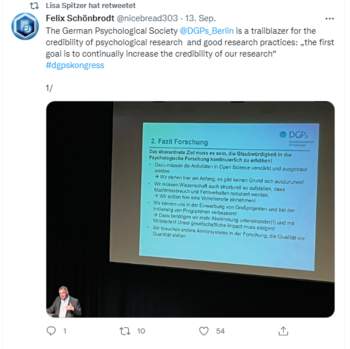
We couldn’t agree more! :)
This newsletter is sent to you by the Open Science interest group of the Psychology Department of Oldenburg (https://uol.de/psychologie/open-science/osig). Would you like to get involved? Resources and projects are coordinated via a Stud.IP study group. Important information and announcements are also sent around to all members of this group. If you are associated with the University of Oldenburg (student or staff) you can send a membership request here and we will approve you as soon as possible.
If you have further questions, please do not hesitate to contact our members via the study group or the mailing list osi_psychology_task-force@lists.uni-oldenburg.de or add your name to Openscience-Psychology mailing list (https://mailman.uni-oldenburg.de/mailman/listinfo/openscience-psychology).
4th issue: 02/23
Moin dear Open Science friends of Oldenburg (and beyond),
we hope you are enjoying the semester break and had a wonderful start in the new year!
Please feel free to share this newsletter and, as always, you’re welcome to join our hybrid biweekly meetings (Tuesdays 11-12 a.m. on uneven calendar weeks in the study group and A7-0-36: Next meeting on 28th of February) that are open to everyone. Previous newsletter issues can be retrieved from the OSIG website.
Recap of the last months
- The beginning of the year was a time for reflection and planning ahead for us. Thanks to everyone (29 people!) who filled out our questionnaire at the beginning of the year. We really gained some great insights, are happy about the positive feedback and are committed to work on improving the points you constructively criticized. Some of out personal highlights from the questionnaire were:
- 100 % of the people who filled out the questionnaire this year are aware of the OSIG, which is 20% more than last year! We are very happy to have increased our outreach and do not want to hear anything about a so-called “selection-bias” ;)
- 20/22 people who are aware of this newsletter actually at least skim through it, which is of course music to our ears!
- We also looked into the goals we set for ourselves a year ago and can proudly report that we accomplished most of them! Some goals we were able to accomplish are …
- Increase our outreach by starting this newsletter and presenting the OSIG to new students
- Organize ourselves better internally
- ... while other goals will be carried to our to-achieve-in-2023-list:
- Increase our momentum on certain projects by recruiting new members
- Continue to facilitate communication across labs
- We also put a special focus on the generation of an ethical and fair participant code that can be implemented in future studies and be easily retrieved. Since this has proven harder than expected, we are still working on this and appreciate every helping hand and brain.
- We are happy to be able to tell you that we are also currently looking into new topics for OS-related workshops and external talks for the summer term (also taking into account some of the great ideas you provided in the OSIG evaluation – thanks a lot!). We will keep you updated on the process. If you cannot wait until then, we recommend this great lecture series featuring OS-related topics by the ZPID.
Action required!
- We are currently looking for new members to join the OSIG. If you are interested in joining us or just getting to know us and learning about our projects without any commitment, please join us on our on-boarding meeting on 28.03. from 11 to 12 o’clock in A7-0-36. We will introduce our running projects, answer all questions that you might have, chat, and maybe even provide some snacks ;) We would be very happy to see interested people there! If you plan to attend, please indicate that here.
- P.S.: We are aware that the meeting is scheduled during the semester break and school holidays in Lower Saxony. If that causes any inconvenience for you, please let us know, and we will find a solution.
- To all new members of the department: Have you considered signing our commitment to research transparency? If you want to add your name to the list, please contact merle.marek@uol.de . Feel free to approach us if you have questions.
- From the OSIG-evaluation we also learned that some people in the department wish for more support in terms of OS practices. We would like to highlight that you can contact us at any time and we will try to help or refer you. There is also a list of expertise within the department that includes information on people who can help you with specific problems/topics.
Open Science News
- At the United Nations 3rd Annual Open Science Conference, the NASA has announced 2023 to be the YEAR OF OPEN SCIENCE. Could that be a sign for you to announce your personal year of open science? We would love to support you if you want!
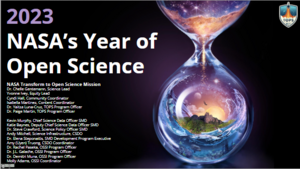
This newsletter is sent to you by the Open Science interest group of the Psychology Department of Oldenburg (https://uol.de/psychologie/open-science/osig). Would you like to get involved? Resources and projects are coordinated via a Stud.IP study group. Important information and announcements are also sent around to all members of this group. If you are associated with the University of Oldenburg (student or staff) you can send a membership request here and we will approve you as soon as possible.
If you have further questions, please do not hesitate to contact our members via the study group or the mailing list osi_psychology_task-force@lists.uni-oldenburg.de or add your name to Openscience-Psychology mailing list (https://mailman.uni-oldenburg.de/mailman/listinfo/openscience-psychology).
5th issue: 06/23
Moin dear Open Science friends of Oldenburg (and beyond),
we hope you are enjoying the warm weather and it gives you energy for the last weeks of the semester!
Please feel free to share this newsletter and, as always, you’re welcome to join our hybrid biweekly meetings (Tuesdays 11-12 a.m. on uneven calendar weeks in the study group and A7-0-36: Next meeting on 4th of July) that are open to everyone. Previous newsletter issues can be retrieved from the OSIG website.
Recap of the last months
- First things first: After 3 years, our beloved founder Nadine Jacobsen (centre) stepped down from her role as coordinator of the OSIG. Fortunately, Cassie Short (left) and Melanie Klapprott (right) agreed to take over her role in April and have been doing a fantastic job so far. A classic situation with both, a smile and a tear... Either way, thanks a lot to all three of them!
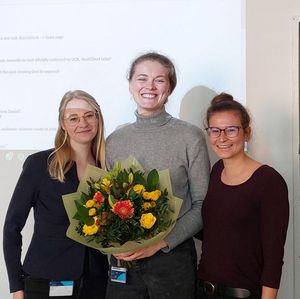
- In March, we organised an onboarding session to recruit new members. The event was a success: We had snacks, got to meet new people and even convinced some of them to join. But that doesn’t mean that the onboarding time is over... Please get in touch if you are interested in joining as well!
- Do you want to share your data but are not sure how/where? We would like to remind you of the data sharing guidelines, which can be found in our StudIP group. Among other useful links and documents, it contains a comprehensive self-made flowchart with information on all the steps of data sharing.
- Over the past few months we have revived a number of projects that had been dormant. We are currently working on code-sharing guidelines and have also looked at the hot topic of AI assisted code generation. We will let you know when we have something to present.
- We also continued the Open Science Series of the Psychological colloquium with two very interesting talks on reproducibility in neuroimaging research.
- On 4th May 2023, Rotem Botvinik-Nezer, PhD (Dartmouth College, Hanover, U.S.) presented her paper Variability in the analysis of a single neuroimaging dataset by many teams in a talk titled The effect of analytical choices on fMRI findings and what we can do about it.
- On a related note, Jochem Rieger presented his paper titled Open and reproducible neuroimaging: From study inception to publication on 8th June 2023.
- We thank both the speakers for the inspiring and interesting research and presentations and if you missed them, we highly recommend the read!
Action required!
- Take part in Cassie's survey:
Cassie has initiated a project that aims to alleviate the persisting concerns of Early Career Researchers (ECRs), from Masters students to Postdocs, about their personal implementation of open science practices. Despite the availability of a range of guidance on the implementation of open science practices, recent evidence suggests that ECRs may continue to experience concerns or uncertainty about their personal application of these practices, which may act as a barrier to engagement.
This project collects information from ECRs on their awareness of available guidance, the basis for their persisting concerns, and their perspectives on how concerns may be alleviated for eight open science practices: (1) pre-registration, (2) open access publication, (3) open data, (4) open code, (5) open peer review, (6) multiverse analysis, (7) FAIR Principles for Data Management, and (8) publication of preprints.
The information will be collated and the proposed solutions will be evaluated for feasibility by more experienced researchers (with the help of the OSIG Task Force). The intended outcome is an article that clearly presents the ECR perspective on personal engagement in open science practices, co-authored by OSIG members and the survey respondents who wish to contribute as co-authors. We hope this will be a helpful resource for ECRs and supervisors of ECRs, and contribute to the trend of increasing engagement in open science practices.
If you would like to contribute your perspective as an ECR, please complete the survey by the end of July: https://cassieoldenburg.limesurvey.net/442212
If have any questions about the project, please contact Cassie at cassie.ann.short@uni-oldenburg.de
Summer special: OS-related conferences
- Some of our members (or colleagues from the department) have been present at various conferences, speaking on topics related to Open Science.
- Cassie Short was a panellist at the Metascience 2023 Conference. She spoke about ‘The Promise and Pitfalls of Multiverse Analysis: A Moderated Discussion’.
- At PuG 2023, Merle Marek was a panellist and spoke about her experiences with registered reports as a PhD student.
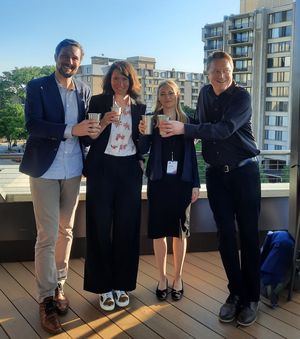
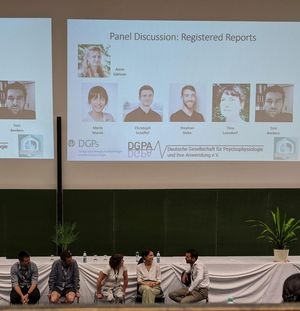
- Some conference contributions from the department to look forward to:
- Jochem Rieger and Aaron Reer are part of the organising team of an educational course on the implementation of open and reproducible neuroimaging at the OHBM Annual meeting in Montréal
- Cassie Short, Daniel Kristanto, and Nadine Jacobsen are going to the SIPS (Society for improving psychological science) 2023 in Padua: Cassie will be hosting a hackathon session to collect and assess Early Career Researchers' (ECRs) concerns about their personal implementation of open science practices. Daniel will lead an unconference about designing multiverse analyses in cognitive network neuroscience, and Nadine will have a lightening talk on multiverse analyses to assess the impact of preprocessing choices on neurophysiological results. You can find a detailed program here. Most of the events will be streamed, so you can also join online.
- Cassie will host a webinar session on Multiverse Analyses at the Meta-Research Methods Summer School Series organized by the Berlin Institute of Health (BIH) at Charité. The webinar will take place on the 3rd July at 5pm, and the recording will be uploaded to YouTube shortly after.
We are happy to see that OS topics are so prominent in our department and that people are spreading their knowledge. :) We wish everyone a great time at their conferences (with or without OS-related contributions)!
... and also a great recovery time afterwards...
Open Science News
- Nadine attended a hybrid symposium on education and reproducibility on 11th May, 2023 organized by the German Reproducibility Network. You can find (almost) all slides of the speakers for download can be found here.
- Can’t get enough? Register now for the Virtual Open Science Conference that will take place from 27th-29th of June 2023
This newsletter is sent to you by the Open Science interest group of the Psychology Department of Oldenburg (https://uol.de/psychologie/open-science/osig). Would you like to get involved? Resources and projects are coordinated via a Stud.IP study group. Important information and announcements are also sent around to all members of this group. If you are associated with the University of Oldenburg (student or staff) you can send a membership request here and we will approve you as soon as possible.
If you have further questions, please do not hesitate to contact our members via the study group or the mailing list osi_psychology_task-force@lists.uni-oldenburg.de or add your name to Openscience-Psychology mailing list (https://mailman.uni-oldenburg.de/mailman/listinfo/openscience-psychology).
6th issue: 10/23
Moin dear Open Science friends of Oldenburg (and beyond),
we hope you enjoyed your semester break and we want to warmly welcome everyone who joined the department since our last issue.
Please feel free to share this newsletter and, as always, you’re welcome to join our hybrid biweekly meetings (Tuesdays 11-12 a.m. on uneven calendar weeks in the study group and A7-0-36: Next meeting on 24th of October) that are open to everyone. Previous newsletter issues can be retrieved from the OSIG website.
Recap of the last months
- As a step towards preparing a department-wide OBC-informed data sharing consent form, Melanie Klapprott and Aaron Reer requested at the Department Council meeting on the 6th September that all labs that currently have an open data consent form share it with OSIG. Any lab heroes with a consent form? OSIG would love to see it! We hope to present our progress on this issue in an upcoming Department Council meeting.
- Andrea Hildebrandt, Daniel Kristanto and Cassie Short gave a full day workshop on “Multiverse Analysis in R” at the DPPD conference in Salzburg last month. Participants learned about the theoretical and statistical underpinning of multiverse analysis, completed a hands-on workshop in R using the Multiverse Package, and received an introduction to multiverse analysis in Python using the Boba Package. We were very pleased to see many Early Career Researchers enthusiastic about applying multiverse analysis in their own research. Happy faces all round! If you would like to get your hands on the materials used in this workshop, please email Cassie: cassie.ann.short@uni-oldenburg.de
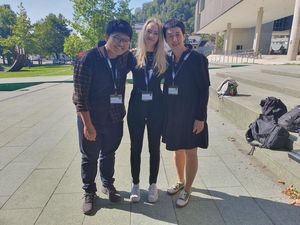
- Aaron Reer and Jochem Rieger, together with international researchers as part of the Device Centre for Open and Reproducible Neuroscience, delivered a workshop on open science practices and tools along the data lifecycle at the OBHM conference. This educational workshop was targeted at lowering the entry bar for researchers to work more transparently and reproducibly. This was achieved by presenting a variety of open science practices and tools together with advice on how to implement these into the workflow, and covered all stages of the research data lifecycle from study inception to the dissemination of results. This workshop was based on an internationally collaborative publication.
- Aaron Reer and Jochem Rieger gave a workshop on open and reproducible MEG and MEGqc – a standardized and automated quality control workflow for MEG BIDS data at the UOL MEG Symposium. This workshop consisted of a lecture and a hands-on session for participants. Aaron is also gearing up to present this tool at the MEG-UKI conference later this month. You can find the MEGqc and related documentation by clicking on the links embedded in the text.
- Cassie Short met with the leader of the Open Science Group at the University of Göttingen, Julika Mimkes, to learn from each other about open science initiatives, at the departmental and university level. The OSIG is looking forward to discussing the possible implementation of these initiatives at our next meeting. Thanks Julika!
- We believe that learning about Open Science should be part of the curriculum. Aaron Reer will give our students an introduction to open science on 17th November as part of the Practical Project seminar.
Action required!
Yoohoo Early Career Researchers! Cassie Short, together with collaborators from the SIPS conference and the OSIG, are creating a Student and Early Career Researcher-led guidance on overcoming barriers to open science practices and we would be very grateful to hear your perspectives.
We are collecting the opinions of Early Career Researchers ranging from Masters Students to Postdoctoral Researchers up to 6 years post-PhD about what they would find most helpful in addressing the concerns they have about implementing open science practices.
If you are within this range of career stages, we would be very grateful if you could spare 30 minutes to complete the survey online: https://umfragen.uni-oldenburg.de/index.php?r=survey/index&sid=385644&lang=en
All responses will be anonymized. If you have any questions about the project, please contact Cassie: cassie.ann.short@uni-oldenburg.de
Open Science News
- It’s a Deal! After failed negotiations in 2018, in September DEAL and Elsevier finally closed an open access agreement for Germany promoting open access of articles published in Elsevier.
- Simine Vazire, a leader in psychology's open science movement, has been announced as the incoming Editor-in-Chief of Psychological Science, effective as of 1st January 2024. We wish Simine a wonderful start!
- Can’t get enough? You might be interested in virtually attending the AIMOS Conference! The Association for Interdisciplinary Metaresearch & Open Science (AIMOS) Conference takes place from 21-23 November and virtual attendance is free! There will be many interesting sessions such as ‘The secret to getting metaresearch done’, ‘Open data’, and ‘How to find phenomena in the midst of the replication crisis’. You can find the programme here and register here.
- The Interest Group for Open and Reproducible Science (IGOR) has published ARIADNE – an online navigator of scientific resources to facilitate transparent and reproducible research across 10 steps of the research process. You can find more information here and read the preprint here.
Wishing you a wonderful start to the semester!
This newsletter is sent to you by the Open Science interest group of the Psychology Department of Oldenburg (https://uol.de/psychologie/open-science/osig). Would you like to get involved? Resources and projects are coordinated via a Stud.IP study group. Important information and announcements are also sent around to all members of this group. If you are associated with the University of Oldenburg (student or staff) you can send a membership request here and we will approve you as soon as possible.
If you have further questions, please do not hesitate to contact our members via the study group or the mailing list osi_psychology_task-force@lists.uni-oldenburg.de or add your name to Openscience-Psychology mailing list (https://mailman.uni-oldenburg.de/mailman/listinfo/openscience-psychology).
7th issue: 02/24
Moin dear Open Science friends of Oldenburg (and beyond),
we hope you are enjoying the semester break and we want to warmly welcome everyone who joined the department since our last issue.
Please feel free to share this newsletter and, as always, you’re welcome to join our hybrid biweekly meetings (Tuesdays 11-12 a.m. on uneven calendar weeks in the study group and A7-0-36: Next meeting on 27th of February) that are open to everyone. Previous newsletter issues can be retrieved from the OSIG website.
Recap of the last months
Since our last newsletter, we have been busy bees when it comes to prizes and applications.
- First things first: OSIG won the Open Science prize awarded by the Universitätsgesellschaft Oldenburg (UGO)! We are still over the moon and hope that we will make good use of the price money (1000 €!!!) by spending it mainly on snacks and drinks at workshops and maybe future speakers.
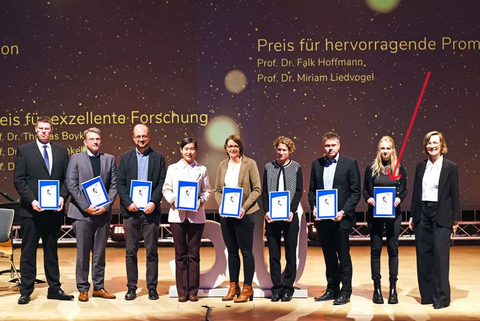
- To be honest, we probably got a little addicted to the high: We also applied for a lightening talk at the Year of Open Science conference 2024 organised by the Center for Open Science, which was *drumroll* accepted!! Cassie Short will present our talk titled “Creating momentum with little resources: how small initiatives can advance the open science movement” between 20:30 and 21:30 CET on Friday, 22nd March. The virtual conference is free of charge, so please feel cordially invited to join us (and all other talks). If you still need extra motivation to join us, here is the abstract of the talk:
The field of psychology has been particularly affected by the replication crisis, and it is evident that measures have to be taken to improve the credibility and reputation of the discipline. These measures should be of large-scale and international scope, but accessibility to and comprehension of these measures to the scientific community should be actively promoted. Local initiatives can contribute significantly to the integration of open science principles into curricula and scientific work. Based on this idea, the Open Science Interest Group (OSIG) identifies as a support structure for scientific staff and is dedicated to enforce transparent, credible, reproducible, and accessible research within the Psychology Department of the University of Oldenburg and possibly beyond. The group was established without funding by PhD-Students and Post-Docs with the primary goal of facilitating the exchange and preservation of knowledge regarding open science principles and practices among students and researchers. As our approaches are easily transferable to other scientific working groups, we want to share our experiences, discuss potential obstacles, and exchange ideas with other low-level initiatives. With our lightning talk, we want to provide a framework and hopefully encourage interested researchers to start a grassroots movement with the goal of advancing open science.
- And since apparently we are on a roll, TORS and OSIG together applied for a DGPS prize for quality assurance in psychology (“Preis zur Qualitätssicherung in der Psychologie 2024”) in February. So far, our nomination was received, but we didn’t hear back yet. Please keep your fingers crossed with us, we’ll let you know how this turns out – good news or bad.
- The practical project (PP) seminar for the winter term 2023/24 is over now, but in November, some seminar teachers invited Aaron to talk about Open Science principles and how they can be used in the PP. We are looking forward to see whether some OS principles made it into the student projects at the symposium in April!
- We are still trying to implement a department-wide informed consent form that allows for easy data sharing. Aaron, therefore, prepared a presentation about the Open Brain Consent for the department’s council in December. At the moment, we are figuring out next steps and will keep you updated.
Action required!
- On March 22nd from 9-17 (A07 0-031) there will be a workshop on Docker, organised by us, TORS, and the RTG and led by Michael Ernst (Goethe-Universität Frankfurt) and Aaron Reer (TORS). You can still sign up here until the 23rd of February and if you spontaneously decide to join after that date, please contact aaron.reer@uol.de. There will be coffee and snacks (thanks again @UGO for the prize ;) )!
- So what is the workshop about? It is basically all about increasing the reproducibility of your code. Docker is a great tool to create consistent, reproducible environments for scientific experiments and analyses. Researchers can package their code, dependencies, and settings into Docker containers, ensuring that others can reproduce their work precisely, regardless of the computing environment. Please find a tentative (and optimistic) schedule for the workshop here.
- The list of publications from the department that use open science principles from 2023 is still quite short (compared to previous years). Can we work on that? Please send a mail to merle.marek@uol.de if you know of any publications that follow any of these principles: open access, open data, preregistration, preregistration + analysis plan, and/or open material. An open access article without supporting data/materials is sufficient to be added to the list. In your email, please include the full citation of the paper and the principles that were followed.
- The new year means that it’s time for us to take a minute to reflect on our work and our outreach. Within the next weeks, we will, therefore, send around another yearly evaluation questionnaire in which we ask you about your opinions, suggestions and feedback. We would really appreciate every input that you are willing to give us. It will hopefully help us improve :)
Open Science News
- Department news: We shifted from teaching Presentation to Open Source PsychoPy :)
To all students who are in the middle of their exams: Good luck – we believe in you!! To everyone else: Have a wonderful and maybe relaxed semester break!
This newsletter is sent to you by the Open Science interest group of the Psychology Department of Oldenburg (https://uol.de/psychologie/open-science/osig). Would you like to get involved? Resources and projects are coordinated via a Stud.IP study group. Important information and announcements are also sent around to all members of this group. If you are associated with the University of Oldenburg (student or staff) you can send a membership request here and we will approve you as soon as possible.
If you have further questions, please do not hesitate to contact our members via the study group or the mailing list osi_psychology_task-force@lists.uni-oldenburg.de or add your name to Openscience-Psychology mailing list (https://mailman.uni-oldenburg.de/mailman/listinfo/openscience-psychology).
8th issue: 06/24
Moin dear Open Science friends of Oldenburg (and beyond),
We hope you are all activating all your resources for the last weeks of the semester.
Please feel free to share this newsletter and, as always, you’re welcome to join our hybrid biweekly meetings (Tuesdays 11-12 a.m. on uneven calendar weeks in the study group and A7-0-36: Next meeting on 2nd of July) that are open to everyone. Previous newsletter issues can be retrieved from the OSIG website.
Recap of the last months
- This year our annual evaluation questionnaire was sent out in March and 20 people responded (50% Masters students, 20% PhD students and 30% others). We’re delighted that so many students took part and we have gathered some interesting ideas for future workshops.
- March was a busy month for us. Cassie Short represented our group at the Center for Open Science (COS) conference on the Year of Open Science 2023. We hope to have spread awareness of the impact that grassroots initiatives like ours can have, and we also learned about other interesting projects.
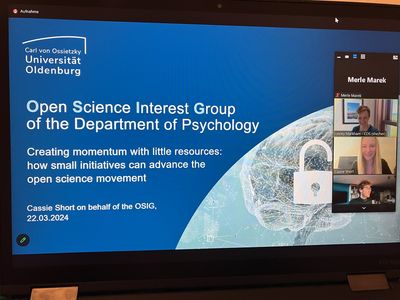
- On the same day, in collaboration with the device center TORS and the RTG Neuromodulation, we organised the workshop "Software Containers in Neuroscience". The workshop focused on virtualisation techniques, in particular Docker. We learned about powerful tools for sharing reproducible workflows to promote good scientific practice and collaborative research. We thank Michael Ernst (Uni Frankfurt) and Aaron Reer (TORS, Uni Oldenburg) for sharing their expertise with us!
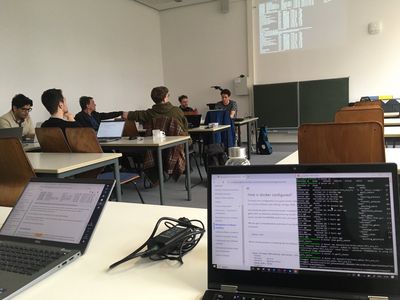
- On 16th May, we continued the Open Science series with a talk by Julius Welzel (Kiel University), a former student of our Master’s program. His presentation was titled “What is the Brain Imaging Data Structure (BIDS) and why should you know about it?”. On a side note, Julius won the IGOR prize for open and reproducible science at the Psychology and Gehirn conference 2024 only two weeks after visiting us. We’re very proud of an alumnus like Julius and hope he continues with his important work!
- On 21st of May, we finally organised our second onboarding meeting. It seems to have been a success, as we now have our first member from the Amba lab (Welcome, Wolf!), our very first member from the department of Medical Physics and Acoustics (division of Communication Acoustics, welcome Till!), and a new student member (Welcome, Dilan!). We’re very happy to have you on board :)
- If you missed it but still want to contribute or get to know us, please don’t hesitate to get in touch!
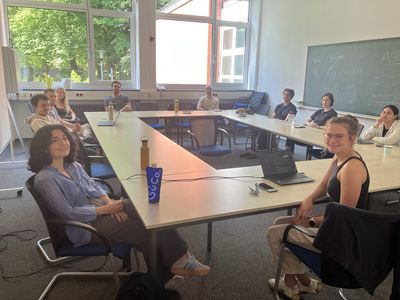
- The Enter Award, which will be awarded for the first time in July 2024, is considered the first prize for open access. It is intended to recognize the commitment to making research freely accessible as well as to promote an open and collaborative culture of education, research and learning in Germany. In collaboration with TORS, we have applied for the Enter Award the competence transfer section.
- In March, Andrea and Cassie (PMuS) presented a lecture and workshop on Multiverse Analysis and Preregistration at the Ludwig-Maximilians University Munich's Open Science Centre. And in June, Cassie, together with collaborators from Ludwig-Maximilians University Munich and the Leibniz Institute for Psychology and Open Science, hosted a workshop on Preregistering the Multiverse at the Society for Open Science's online conference 2024
Action required!
- You are all more than welcome to join our upcoming Open Science Series. Max Frank (LMU) will visit us in Oldenburg on 04th of July and talk about “The good, the bad, and the ugly of open Science”. We know it’s the last session of the term, but we’re convinced that Max’s talk will give us something to think about during the semester break.
Open Science News
- Since our last newsletter, our university has a new Open Science coordinator. Melanie Klapprott met Ina Bosma and told her about our initiative and our projects. They agreed to collaborate closely in the future. We wish her all the best in the “new” role and look forward to working together.
- In February, Springer Nature published a press release announcing that “All journal articles will now feature a Code Availability section and authors will be encouraged to share code publicly, using permanent identifiers, and citing code they have used.” . It might only be a small step, but maybe it motivates you to publish your code in your new project as well?
- You enjoy reading our newsletter immensely, but sometimes still wonder how Open Science affects our society as a whole? We understand... We found some interesting reading for the summer: Cole and colleagues published a preprint on “The societal impact of Open Science – a scoping review”
This newsletter is sent to you by the Open Science interest group of the Psychology Department of Oldenburg (https://uol.de/psychologie/open-science/osig). Would you like to get involved? Resources and projects are coordinated via a Stud.IP study group. Important information and announcements are also sent around to all members of this group. If you are associated with the University of Oldenburg (student or staff) you can send a membership request here and we will approve you as soon as possible.
If you have further questions, please do not hesitate to contact our members via the study group or the mailing list osi_psychology_task-force@lists.uni-oldenburg.de or add your name to Openscience-Psychology mailing list (https://mailman.uni-oldenburg.de/mailman/listinfo/openscience-psychology).
9th issue: 10/24
Moin dear Open Science friends of Oldenburg (and beyond),
Please feel free to share this newsletter and, as always, you’re welcome to join our hybrid biweekly meetings (Tuesdays 11-12 a.m. on uneven calendar weeks in the study group and A7-0-36: Next meeting on 5th of November) that are open to everyone. Previous newsletter issues can be retrieved from the OSIG website.
Recap of the last months
- Although we enjoyed a well-deserved summer break at OSIG, we didn't let things stall! Marc, Aaron, Daniel, and Amir have been hard at work creating a support sheet that explores how artificial intelligence (AI) can streamline your coding process. As code sharing becomes a standard in research publications, well-documented and efficient code is more crucial than ever. The support sheet dives into how AI can help improve coding practices, while also discussing its limitations. Let us know what you think!
- We’re thrilled to share a sneak peek with you! Over the summer, some of our members have been brainstorming an exciting idea for spring 2025: an Open Science conference right here at our department. It will be a fantastic opportunity to learn more about open science, network with like-minded individuals, and connect over our shared passion. And if that doesn’t already sound great, there will be cookies too! Stay tuned for updates, and keep an eye on our emails and newsletters—we may be looking for contributors soon. We can’t wait; can you?
Action required!
- Have you heard about the EEGMany Analysts project? Learn more here. This initiative aims to test the replicability of brain-behavior associations in EEG research and was launched by the University of Hamburg. Exciting news—some of our department members are contributing their own analysis pipelines! We’re eagerly awaiting the results and will share updates as they come in.
Upcoming events
- Ina Bosma, the Open Science coordinator at our university, will be joining our next OSIG meeting on November 5th. We’re excited to meet her in person and discuss her insights on open science. If you’d like to connect with her and the community, feel free to join us at our regular meeting time, 11 am in room A7-36.
- This year, we will offer two sessions as part of the Practical Project Seminar series. On November 18th, Melanie and Merle will lead an interactive session on preregistration, providing hands-on guidance for enhancing research transparency. Then, on December 9th, Micha will delve into the essentials of version control with Git, equipping participants with practical skills for managing and sharing code effectively.
This newsletter is sent to you by the Open Science interest group of the Psychology Department of Oldenburg (https://uol.de/psychologie/open-science/osig). Would you like to get involved? Resources and projects are coordinated via a Stud.IP study group. Important information and announcements are also sent around to all members of this group. If you are associated with the University of Oldenburg (student or staff) you can send a membership request here and we will approve you as soon as possible.
If you have further questions, please do not hesitate to contact our members via the study group or the mailing list osi_psychology_task-force@lists.uni-oldenburg.de or add your name to Openscience-Psychology mailing list (https://mailman.uni-oldenburg.de/mailman/listinfo/openscience-psychology).



